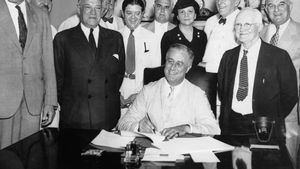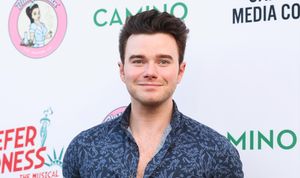To go where no out transgender actor has gone before, Karla Sofía Gascón has crafted a trans character unlike any the world has ever seen.
In the Oscar-favorite film Emilia Pérez written and directed by Jacques Audiard, Gascón stars opposite equally brilliant Zoe Saldaña and Selena Gomez. Gascón plays the titular Emilia, a Mexican cartel head who transitions to live the life she’s always wanted. Emilia is both the hero and villain of her own story: a lesbian, a CEO, a leader, a lover, a singer, and many other things trans characters rarely get to be on-screen.
Emilia Pérez was a major presence at this year's Golden Globes, garnering 10 nominations — the most ever for a comedy or musical film — and winning gold for Best Comedy or Musical, Best Supporting Actress (Zoe Saldaña), Best Song (“El Mal”) and Best Non-English-language Film. Gascón earned a nomination for Best Performance by a Female Actor in a Musical or Comedy and delivered a moving speech about the importance of trans visibility after the film won Best Comedy or Musical. If the awards season momentum continues, she will become the first out trans actor nominated for an Academy Award.
 Emilia Pérez (Karla Sofía Gascon) comforts love interest Epifanía (Adriana Paz). Netflix
Emilia Pérez (Karla Sofía Gascon) comforts love interest Epifanía (Adriana Paz). Netflix
The acclaim for Emilia Pérez is culturally and politically significant, as the film and Gascón’s role challenge ideas of what trans representation can and should be. In the musical-crime comedy, Emilia is a criminal, she’s violent, she hides her identity from her wife, and she lives a tragic life. But she’s also fearful, strong, loving, loved, curious, hopeful, loyal, and brilliant. Defying the law and social norms, Emilia refuses to be defined by others, exactly as her portrayer intended.
“I give all my truth and all my soul. Each person is different; each trans experience is different. Humans are not robots; we don’t behave the same way, nor do we perceive things the same. We have the same emotions but within different ranges. Humans are complex, and it makes me very upset when they try to reduce us to a group or a single idea,” Gascón says.
“We are used to seeing these kinds of characters portrayed as simple stereotypes — boxed into prostitution or cabaret, exaggerated comedies, or tragic dramas,” she continues. “Well, no, my dear. Trans people, gays, lesbians, and bisexuals exist everywhere: in sports, science, economics, politics, Christmas, and summer — even in the world of drug trafficking. The problem is that certain institutions find it hard to acknowledge this truth.”
While some critics have argued that the film falls into negative tropes about trans women being violent or deceptive, for Gascón, some of those same complexities are what made the role so powerful. Instead of letting Emilia’s flaws flatten the character into a harmful stereotype, Gascón, under the direction of Audiard, created a three-dimensional and layered human being.
“I think Emilia adapted a bit to me, and I to her. As an actress, I can’t judge my characters; I have to understand them,” she says. “What kind of actress would I be if I portrayed my characters from the outside, questioning their decisions instead of understanding their struggles? Emilia is a very, very complex character who comes from the deepest darkness.... That’s what I gave her: the thickest darkness so that the light could shine brighter.”
Despite the online controversy, Gascón has heard from many trans people who watched and loved the film, expressing that they’re thankful she’s expanding how movie audiences see trans women. “The only comments I’ve received about this are expressions of gratitude for how, for the first time, a trans character is approached in a way never seen before, placing the community in a global context,” she says. “It conveys the understanding that this is not something limited to certain spaces but a social reality we cannot ignore.”
At the 2024 Out100 event, Gascón spoke onstage as an honoree. She shared that a mother had recently approached her to say that the film and Gascón’s press tour are making her trans daughter feel less alone, helping her realize “that there is a place for us in this world.” In a political era when trans rights — and youth, in particular — are under attack, this visibility is vital.
“Every day I remember why I should not let myself sink by criticism or hatred, because there are many people who need us in this world, because we are the owners of our bodies and we do not hurt anyone by loving or feeling,” she said. “Our identity is the only thing we have, and no matter how hard they try, they will never be able to take it away from us — because it is ours.”
While Gascón may become the first actress to break the transgender glass ceiling at the Oscars, she knows the world is overflowing with talented trans creatives who can’t wait to stride the same path she’s walking now.
“All actors and actresses, regardless of their gender, sexual orientation, or skin color, deserve to be recognized for putting their soul into a life written on paper,” she says. “There are many trans actors and actresses who spend their lives acting in small theaters telling big stories. Maybe in a few years, it will be normal to see them collecting awards without anyone being surprised. Four years ago, I was doing the same thing, giving performances in a small theater for very few spectators. That is the hope I want to leave to all my fellow actors.”
This article is part of the Out January/February issue, which hits newsstands February 4. Support queer media and subscribe— or download the issue through Apple News, Zinio, Nook, or PressReader starting January 23.





 Emilia Pérez (Karla Sofía Gascon) comforts love interest Epifanía (Adriana Paz). Netflix
Emilia Pérez (Karla Sofía Gascon) comforts love interest Epifanía (Adriana Paz). Netflix




















































































Cooper Koch and twin bro spark controversy with eye-popping 'White Lotus' parody